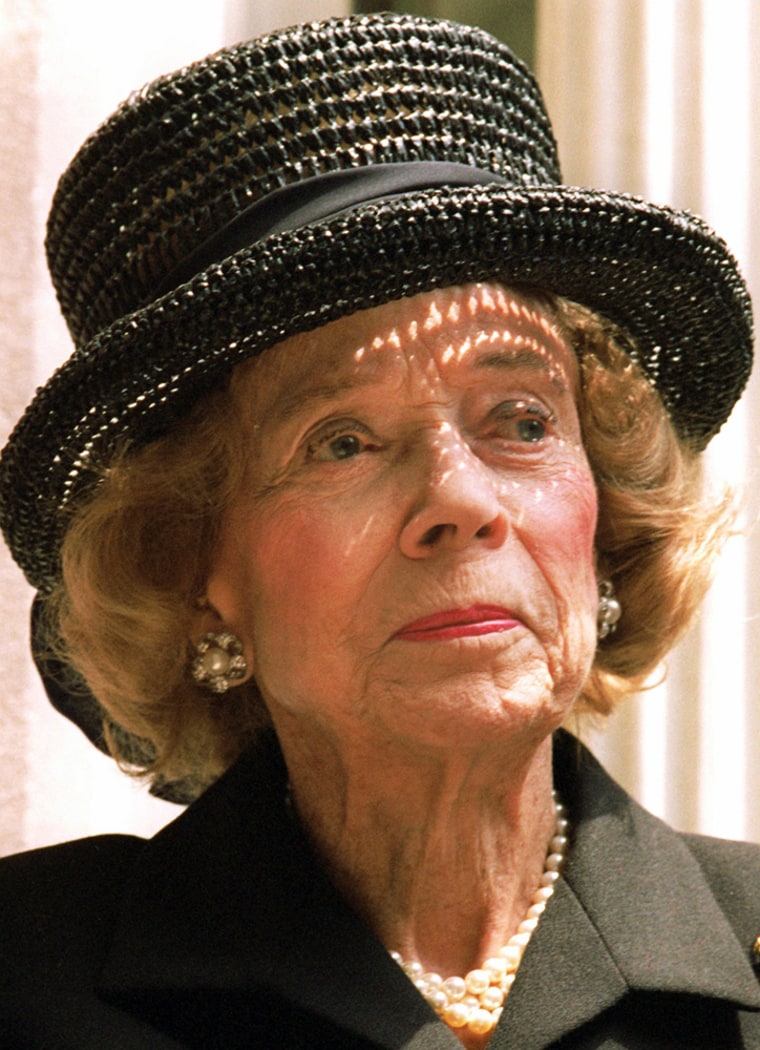Brooke Astor, the grande dame of New York City society who spent her long life giving away millions of dollars, carefully arranged to continue her philanthropy after she died. But her favorite charities fear that the nasty family fight over her estate could bleed millions of dollars from the bequest she left them.
The judge overseeing the estate battle has warned — perhaps in jest, perhaps not — that if the case is left to the lawyers, it will be litigated until the entire $198 million is gone — much like the fictional Jarndyce and Jarndyce case that cast its gloom over Charles Dickens' "Bleak House."
That is not what Astor, who died in August at 105, would have wanted, the judge added. She took pleasure in donating hundreds of millions to the arts and the unfortunate after the 1959 death of her husband, Vincent Astor, heir to the fortune his great-great-grandfather, John Jacob Astor, made in real estate and the fur trade.
A tale of two wills
The family feud, being aired in Surrogate's Court in White Plains, is generally over which of two wills conveys Astor's real intentions.
Lawyers for the Metropolitan Museum of Art, the New York Public Library and other organizations specified in the wills have been pushing for a quick settlement to conserve Astor's assets. Her estate is worth an estimated $198 million, but the charities she designated might have to share as little as $34 million of that — minus expenses — depending on which of the wills is accepted.
"We are eager in seeking a quick, comprehensive resolution in all the issues rather than seeing what promises to be a long, piecemeal and arduous litigation," said Robert Shwartz, representing the library.
But settlement talks have stalled and the lawyers — there were 15 at the last public session — are due back in court Oct. 17. The case reflects the family division that was evident last year when Astor's grandson, Philip Marshall, claimed that his father, Anthony Marshall, was enriching himself at the expense of Astor's estate and her health.
When that dispute went to court in Manhattan, Astor's friend, Annette de la Renta, was appointed her guardian. In the fight over the wills, she is asking Surrogate Judge Anthony Scarpino to appoint her temporary administrator of the estate and to rule that Astor's 1997 will is the last one signed while she was competent. De la Renta, wife of designer Oscar de la Renta, is backed by Philip Marshall.
Anthony Marshall says de la Renta is biased against him; he has proposed his own temporary administrator. Marshall wants the judge to approve a 2002 will and its codicils, or additions, which benefit Marshall at the expense of the charities.
Trust controls $66 million
Astor's bequests to more than a dozen specific charities would come out of the Vincent Astor Trust, which is worth an estimated $66 million. Her own property accounts for the remaining $132 million, and some of that may also go to charities not yet chosen, depending on the judge's rulings.
But because of what the museum's lawyer called "a very unusual clause," her wills can be read to mean that litigation expenses — plus her funeral expenses, last medical expenses, and whatever it takes to keep up the value of her real estate — are to be paid out of the Vincent Astor fund.
The legal expenses, especially, could be considerable, given the likelihood of lawsuits in the contentious case.
"While it seems like a lot of money, $66 million split among the charities, and after subtracting debts and administration expenses, may not make things worth the fight in terms of fees," said John Barnosky, the Met's lawyer.
The museum and the library would get the biggest shares of the Vincent Astor funds — 25 percent each, or $16.5 million, under the 1997 will, or 8 percent each, or $5.28 million under the 2002 will and codicils.
Gifts of that size are not uncommon at either institution and the entire bequest, though substantial and well publicized, is dwarfed by some others. Leona Helmsley, the real estate queen who died Aug. 20, left more than $4 billion to charity.
Smaller beneficiaries share lawyer
Astor's wills leave smaller stakes, down to 1 percent, or straight cash amounts to other organizations, some of whom are saving on court costs by sharing a lawyer. Andrew Schau, who represents Rockefeller University, the Bronx Zoo, Historic Hudson Valley, the Animal Medical Center and the Pierpont Morgan Library, said in court that he shared the concerns voiced by the Metropolitan and the library and urged a settlement.
Scarpino ordered the settlement talks after saying there were "a million ways to settle this case in 15 minutes." But he noted that the lawyers "will be happy to litigate this matter to the very end of this stream of money that's there."
In "Bleak House," a large inheritance led to the case known as Jarndyce and Jarndyce, which persisted for generations. By the time it was settled, almost nothing was left for the descendants.
Most of the lawyers — and spokesmen at the Metropolitan and the library — would not discuss the case outside the courtroom. But Kenneth Warner, Anthony Marshall's attorney, said Marshall also favors a quick settlement because the money he plans to give to charities — which are not named in the will — would also be lessened by a long court case.
The state attorney general's office has sent a representative to the Surrogate's Court sessions, and the entire case may soon be complicated by a criminal investigation in Manhattan, where the district attorney reportedly is preparing to have a grand jury look into the handling of the Astor estate.
Jeffrey Lerner of the attorney general's office would say only that his agency is "in favor of a fair, equitable and legal disbursement of assets."
